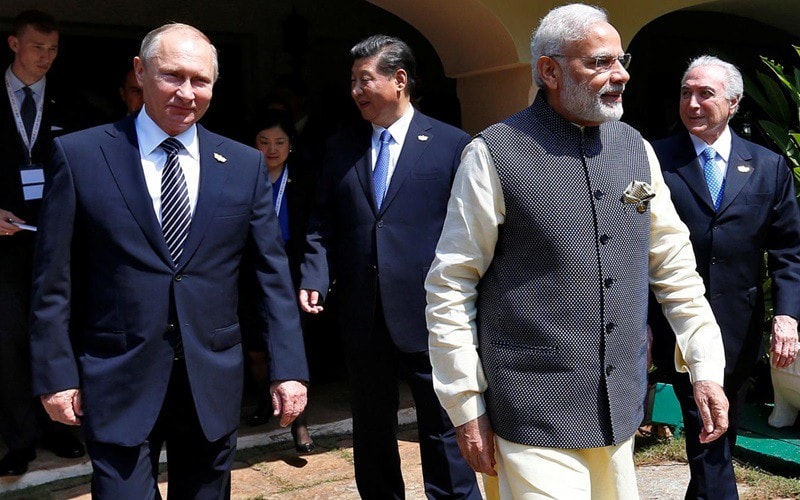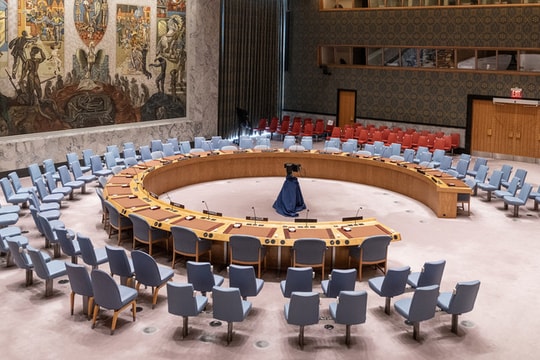India and China are cold, Russia tries to be warm with both
Russia is moving closer to China in many ways. But at the same time, Russia also maintains historically friendly relations with India - China's rival.
During Indian Prime Minister Narendra Modi’s visit to Vladivostok, Russia, for the forum in early September 2019, Moscow and New Delhi signed 15 agreements in sectors ranging from defense to energy. The Indian leader also pledged $1 billion in credit lines to Russia’s Far East, a region the Kremlin has long sought to boost economic growth.
 |
| Leaders of Russia (Putin), China (Xi), and India (Modi). Photo: Reuters |
But while Mr Modi was the chief guest at this year’s forum, many Western journalists watching the event were focused on China. Not surprisingly, President Xi Jinping was the star of the same event last year. The convergence of Beijing and Moscow is one of the biggest geopolitical stories of the decade.
The question arises, with Russia moving closer to India, what will the relationship between Russia and India be like.
Through India to remind China?
The Eastern Economic Forum was first launched in 2015, as the Kremlin turned to Asia, particularly China, for trade and investment as it was shunned by the West over Ukraine. And one of Moscow’s priorities has been to raise funds to boost economic activity in Russia’s long-underdeveloped Far East.
However, Russia's efforts to attract investment to the Far East have been ineffective. Even China has invested little there.
According to research by Artyom Lukin of the Far Eastern Federal University (Russia), there are only four major Chinese investment projects in the Russian Far East, and their total value is less than $1 billion. These four projects include a casino near Vladivostok, a coal mine in the Trans-Baikal Territory, a gold mine also in the Trans-Baikal Territory, and an iron ore mining company in the Jewish Autonomous Region.
Despite all Moscow’s initiatives, Chinese and other foreign investors have yet to flock to the Russian Far East. There are two main reasons for this.
First, Western sanctions impose costs large enough to deter investors.
Second, the exploitation of natural resources - the main strength of the Russian Far East - is capital-intensive due to harsh environmental conditions and the lack of suitable infrastructure. For foreign companies, capital recovery is not guaranteed.
As a result, many Chinese investors choose to purchase raw materials from countries like Brazil and Indonesia instead of the Russian Far East.
In response, Russia has begun to look to India. Researcher Lukin explains that Russia’s prominence of Modi at this year’s Eastern Economic Forum is partly due to Russia’s desire to create a sense of urgency for China.
“Mr Putin (Russian President) may want to create a little jealousy on the Chinese side, to make China see that if they don't invest in the Far East, India will step in.”
At the Eastern Economic Forum, Moscow and Delhi signed a number of memorandums of understanding, including a plan to develop a maritime corridor from Vladivostok to the Indian port of Chennai, an agreement to allow India to manufacture components for Russian military equipment, an agreement for an Indian company to buy a Russian LNG company, and a joint mining project between an Indian coal company and two Russian entities.
Furthermore, Mr. Modi also announced that India will provide $1 billion in credit for economic development projects in the Russian Far East.
China still surpasses India in relations with Russia
Still, India has a long way to go before it can compete with China in the Russian Far East or anywhere else in the country. For example, in 2018, trade between Russia and India was $11 billion, while trade between Russia and China reached $107 billion in the same period, making China Russia’s largest trading partner.
The situation is similar in the defense sphere. Although Russia and India have a long and rich history of defense cooperation, Beijing has overshadowed New Delhi as Moscow’s partner in several key areas.
Viktor Murakhovsky, editor-in-chief of the Russian defense magazine “Arsenal of the Fatherland,” stated that although Russia is a strategic partner with both China and India, Russia's military cooperation with India is of a different level and quality.
“If we talk about interaction between the two countries' militaries, joint exercises, and joint military planning, then our relations with India in this area are largely formal and symbolic,” Murakhovsky said.
But on the other hand, Murakhovsky notes that joint arms production, military technology exchange and arms sales between Russia and India are larger than between Russia and China.
Russian experts that the National Interest spoke to all expressed confidence that Moscow will not have to choose between Beijing and New Delhi.
They argue that despite much talk in the West about India and China being antagonistic, the two countries are far from being enemies. Looking at Sino-Indian relations in recent years, Russian experts see encouraging signs, such as Beijing and New Delhi’s success in de-escalating tensions during the 2017 border crisis, or the lack of major military deployments against each other…
The above factors have led Moscow to conclude that neither Beijing nor New Delhi opposes Russia's efforts to maintain friendly relations with both.
Some Russian experts even believe that the West's pressure on India on what they call human rights issues could push India closer to China, similar to how the West's pressure on Russia has pushed Russia closer to China./.


.jpeg)




